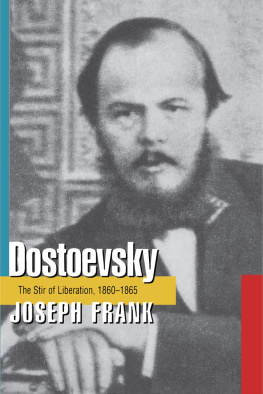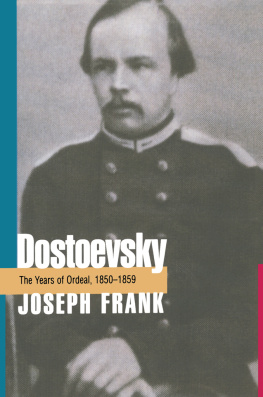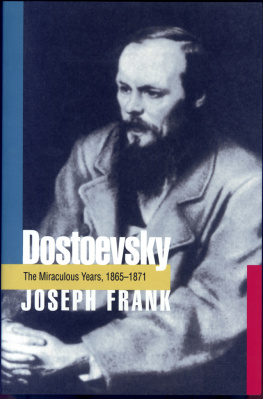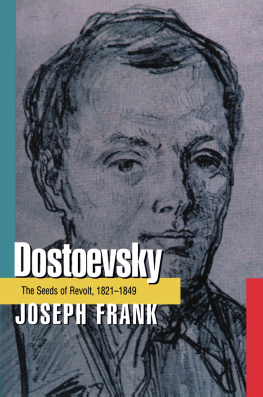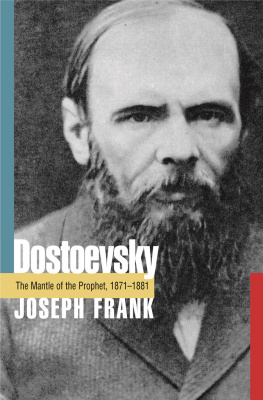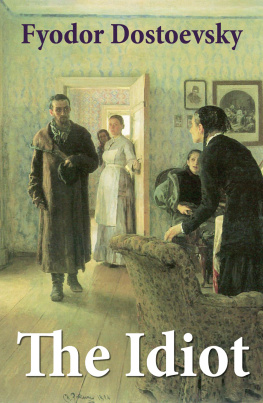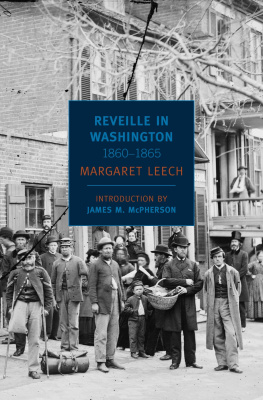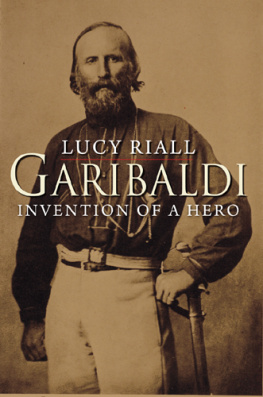Joseph Frank - Dostoevsky: The Stir of Liberation, 1860-1865
Here you can read online Joseph Frank - Dostoevsky: The Stir of Liberation, 1860-1865 full text of the book (entire story) in english for free. Download pdf and epub, get meaning, cover and reviews about this ebook. year: 2020, publisher: Princeton University Press, genre: Non-fiction / History. Description of the work, (preface) as well as reviews are available. Best literature library LitArk.com created for fans of good reading and offers a wide selection of genres:
Romance novel
Science fiction
Adventure
Detective
Science
History
Home and family
Prose
Art
Politics
Computer
Non-fiction
Religion
Business
Children
Humor
Choose a favorite category and find really read worthwhile books. Enjoy immersion in the world of imagination, feel the emotions of the characters or learn something new for yourself, make an fascinating discovery.
- Book:Dostoevsky: The Stir of Liberation, 1860-1865
- Author:
- Publisher:Princeton University Press
- Genre:
- Year:2020
- Rating:4 / 5
- Favourites:Add to favourites
- Your mark:
- 80
- 1
- 2
- 3
- 4
- 5
Dostoevsky: The Stir of Liberation, 1860-1865: summary, description and annotation
We offer to read an annotation, description, summary or preface (depends on what the author of the book "Dostoevsky: The Stir of Liberation, 1860-1865" wrote himself). If you haven't found the necessary information about the book — write in the comments, we will try to find it.
Dostoevsky: The Stir of Liberation, 1860-1865 — read online for free the complete book (whole text) full work
Below is the text of the book, divided by pages. System saving the place of the last page read, allows you to conveniently read the book "Dostoevsky: The Stir of Liberation, 1860-1865" online for free, without having to search again every time where you left off. Put a bookmark, and you can go to the page where you finished reading at any time.
Font size:
Interval:
Bookmark:

1860-1865
PRESS
Copyright 1986 by Princeton University Press
Published by Princeton University Press, 41 William Street,
Princeton, New Jersey 08540
In the United Kingdom: Princeton University Press,
Guildford, Surrey
All Rights Reserved
Library of Congress Cataloging in Publication Data will
be found on the last printed page of this book
eISBN: 978-1-400-84423-4 (eBook)
R0
This book is dedicated to
Francis Fergusson
A dear friend and mentor,
whose own works are models
of critical illumination
ix
xi
xv
Unless otherwise noted, all illustrations are from Feodor Mikhailovich Dostoevsky v Portretakh, illyustratsiyakh, dokumentakh, ed. V. S. Nechaeva (Moscow, 1972).
This is the third installment of what has now become a five-volume work dealing with the life and writings of Dostoevsky. My initial plan called for only four volumes, but I was forced to extend it when the present book emerged rather unexpectedly. The time-span covered here (1860-1865) originally formed the closing chapters of volume two, which would thus have included not only Dostoevskys years in Siberia but also his return and re-entry into literary life. But once I began to investigate these five years more closely in the light of new archival material, recent scholarly studies such as the two volumes on Dostoevskys magazines by V. S. Nechaeva, and the rich panorama of the activities of the radical intelligentsia contained in Franco Venturis classic Roots of Revolution, I realized that they required a more extensive treatment.
In fact, the pages of the present volume deal with an extremely important period in Dostoevskys life that has been more or less scanted. Commentators were naturally eager, as I had been myself, to pass over them rapidly so as to reach the major novels that began to appear in the middle and late 1860s. Yet in the early 1860s, as the editor of two important journals, Dostoevsky stood much more directly at the center of Russian social-cultural life than during the remainder of the decade, when he returned to being exclusively a novelist again and lived abroad in self-imposed isolation. It was also during these years, as I hope to show, that his social-political outlook was definitively reshaped.
It was then that he drew the practical conclusionswhich would remain essentially unchanged, despite some differences in accentuation, for the rest of his lifefrom the experiences of his Siberian exile. What he later called the regeneration of his convictions did not occur instantaneously but took a certain amount of time; it took, in fact, the amount of time required for the events narrated here to run their course (and even a little beyond). A detailed consideration of these events will help to clarify why Dostoevsky came to the conclusions that he did; and it should also scotch the still widespread notion that he emerged from prison camp blindly prepared to support a tyrannical rgime of the most vilely reactionary stripe.
This third volume also brings me back to my initial point of departure. I first began to study Dostoevsky seriously in connection with Notes from Underground, and it was my effort to come to grips with this textan effort whose results are included in the present bookthat shaped my whole approach to Dostoevskys work. For I became persuaded that the issues of his time not only furnished him with external stimulus but entered much more deeply into his creative process than had generally been perceived, and that, for this reason, his creations could not really be understood without a solid knowledge of the social-cultural environment in which he worked. Dostoevskys response to the ideological conflicts of his society were of course affected by his personality and experiences; but these acquire artistic significance only when they enter into creative symbiosis with the great moral questions posed by the ferment of Russian history in Dostoevskys lifetime, particularly after 1861.
To comprehend this symbiosis, one must study the many channels through which the social-cultural turbulence of the early 1860s flowed into Dostoevskys creative imagination. Such channels included a personal involvement that was far from being only that of a spectator or a disabused commentator; Dostoevsky was a participant as well as an observer, who was often on the spot during important manifestations of social unrest. Even when absent, he was heart and soul engaged in following the tumultuous course of events on whose outcome, he was passionately convinced, depended the future destiny of Russia (and hence, ultimately, of humanity as a whole). As we shall see, he also intervened personally, even at the risk of casting suspicion on himself and endangering his interests, when he believed that his intercession might help to ease a turbulent situation heading toward disaster. No book known to me does full justice to Dostoevskys total immersion in the unruly sea (the title of a novel by Pisemsky) whipped up by the storm winds of post-liberation social discontent; and I have felt it important to fill this lacuna in the literature, even if it meant the unanticipated addition of an extra volume to my series.
THE FAVORABLE reception accorded my second volume exceeded all my expectations, and I wish particularly to thank the members of the National Book Critics Circle, who awarded it their annual prize for biography in 1984. Such an accolade, given by a group professionally engaged in evaluating current literary production, is a very great honor, and I am exceedingly grateful for this evidence of widespread appreciation. I take it, however, not merely as a source of personal satisfaction but also as a vindication of the perspective in which I have chosen to write. For it proves that a literary biographer is not necessarily forced to place the purely extrinsic, anecdotal details of the private life of his subject in the foreground, and that these can be presented in terms of the writers work and strictly subordinated to a fuller delineation of the social-cultural and literary context much more directly linked with creative production.
The dedication of this book is but a small repayment for a debt of inspiration and encouragement contracted during a friendship of over forty years. If an author writes for an ideal reader who represents the standard to which he aspires, then for me this standard has always been embodied in the person and writings of Francis Fergusson; and I have tried as best I could to live up to the example set by his own scrupulousness and integrity.
Once again I am happy to thank the Rockefeller Foundation for its generosity in awarding me a Humanities Fellowship during the academic year 1983-1984, which helped to finance a years leave of absence from teaching duties at Princeton. Part of that year was spent in the lively atmosphere of the Stanford Humanities Center, which provided congenial working conditions, and whose Director, Ian Watt, created a stimulating intellectual climate in which to exchange ideas with others in various fields. The members of the staff of the Center were very helpful in facilitating the preparation of the manuscript. During the fall term of 1985 I was privileged, as a Directors Visitor, to be a member of the Institute for Advanced Study at Princeton, and I wish to express my warm gratitude to the Director, Harry Woolf, for according me this appointment. Final work on the manuscript and galleys was completed in this ideal atmosphere for scholarly research.
Font size:
Interval:
Bookmark:
Similar books «Dostoevsky: The Stir of Liberation, 1860-1865»
Look at similar books to Dostoevsky: The Stir of Liberation, 1860-1865. We have selected literature similar in name and meaning in the hope of providing readers with more options to find new, interesting, not yet read works.
Discussion, reviews of the book Dostoevsky: The Stir of Liberation, 1860-1865 and just readers' own opinions. Leave your comments, write what you think about the work, its meaning or the main characters. Specify what exactly you liked and what you didn't like, and why you think so.

